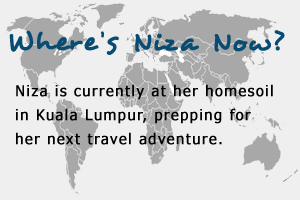Cameron Highland; Revisited
20 Dec 2010. Again, another impromptu vacation. This time, we are doing our weekend in Cameron Highland. The typical gateaway spot for us. Especially when the year end is coming and some leaves need to be cleared. Our adventurous spirits fancy something like a road trip to Hatyai and Phuket, but eventually it had to be put off to later due to the recent flood that striked north Malaysia and South of Thailand.
So, you may ask, why Cameron? Well, because it was near to KL, about 250km via Tapah. Secondly, because it has cool climate that is suitable for relaxation, which we lowlanders direly need (however, being school holidays and the place is now facing a great deal of deforestation due to the rapid urbanization, this whole statement is a total fallacy – we neither get the peace and quiet nor the very cool climate). And thirdly, this place is sacred to me, because it was the place where I actually fall in love with my husband and finally agree to marry him, ahem.
Cameron Highland was discovered by William Cameron, a British surveyor in 1885, when he found a plateau on a hilly forest of Pahang during his mapping expedition. It was Sir George Maxwell, a British High Commissioners in Malaya at that time who saw the full potential of the place and decided to transform it into a hill station. Six years later, a winding road from Tapah was completed; soon the place was occupied by tea planters and vegetable growers who found the fertile soil and the cool climate were very much suitable for their crops.

Cameron Highland; yesterday and today. (First photo courtesy of the Time Tunnel)

Our first destination after checking in at Brinchang. The Sungai Palas Boh tea plantation.

The blue and green of Cameron Highland. Afar, covered in mist is the Irau Mountain I presume.

Tea shrubberies dominated the place

The quarters of the tea plantation workers. Nice contrast amidst the green slopes.

A stairway that leads to another quarters.

Soft and wet moss carpeting its floor. Adjacently situated to the Irau mountain which is notably known as the mossy forest, the place somehow inherits its traits. We attempted the climbing to the Irau mountain base, but unfortunately our feeble car is no match for it (note: the Irau Mountain is reachable from the plantation enroute to the Mount Brinchang Power Generator Station). To those interested, Irau Mountain is worth the climb. Take this from someone who made the decision about her life commitment on its peak. Yeah.

Another view of the quarters.

Plantation workers on their daily routine.

Yellow blossoms

The hanging platform of the Boh Cafe overlooking the astounding greenery. Having a cuppa in the cool air is simply refreshing.

Inside the Cafe. It is actually linked with the factory. The passage that interconnects the two is decorated with tea logs. Nice.

On the way out, we spotted these common mode of transports amongst planters.

And another view of the workers’ quarters. Somehow, these striking blue long houses have became an addictive photography subject to me.

This 4-wheeler is a common sight here. Great for climbing muddy, steep terrain.

We spotted an accident on our way down to Brinchang from the Sg. Palas tea plantation. One is easily caught with accidents along the narrow and twisted road if not being careful. While we gagged over this minor which cause an almost 1km long of traffic (typical Malaysian, we are), ironically a major devastation is actually happening at the same time at another end of the road, some 50km away. We only knew when it made to the prime news that night. 27 were killed, and 25 of them are of thai nationality.

Caption from The Star Online, dated 21 Dec 2010. For full story, read here.

We continued driving to Brinchang. Along the way, one signboard caught my attention. This must be a nature wonder, and the only one in the world. Self-plucking strawberries! ![]() LOL
LOL


Very good post! I’ll bookmark this blog and look forward to more like it.